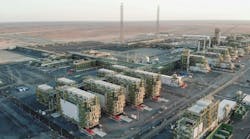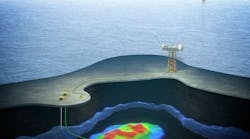Energy experts are bullish about oil service company stocks for 2003 but more cautious about exploration and production stocks, according to an annual energy poll conducted by RBC Capital Markets.
The poll was taken of the 400 participants at the RBC Capital Markets North American Energy Conference in Houston Nov.12-14. Participants included energy industry specialists, company representatives, institutional investors, and securities analysts.
RBC Capital Markets is the global brand name for the corporate and investment banking divisions of the Royal Bank of Canada.
Regarding stock performance, respondents forecast that the Oil Service Index would end 2002 at 84.49 and close 2003 at 98.83, resulting in a 17% increase in 2003. On average, respondents expect E&P stocks to be up 9% in 2003 compared with 2002.
"Overall, the survey responses, in addition to the company presentations and panel topics, affirmed our energy team's thematic that North American natural gas prices are heading higher, the US is prospect-constrained, and select international markets offer intriguing growth opportunities," said Kurt Hallead, managing director and senior analyst at RBC Capital Markets.
Commodity prices
A war with Iraq would cause the price of oil to jump to as much as $34.69/bbl, according to those surveyed. Respondents were split on the impact of the threat of war: 30% said it has had a favorable impact for their firms, while 31% said it has been unfavorable.
Meanwhile, war or not, oil prices were predicted to increase from the then-current price of $26/bbl to $26.50/bbl by yearend 2002 and remain flat in 2003, with an average price of $25.89/bbl.
"We believe OPEC, in its role as the 'Fed of the Oil Markets,' will manage prices within its stated band between $22 and $28 in 2003," Hallead said of the Organization of Petroleum Exporting Countries.
Almost two thirds of the respondents believe US natural gas production has peaked and is now in perpetual decline. They expected the price of natural gas to be flat in 2002 and up only slightly in 2003.
In the longer term, declining US gas production was forecast to result in more volatility and continued higher prices.
"Gas will trade at a premium to oil and distillates for a time, and oil service activity will be strong," one respondent wrote. With respect to business trends, both E&P and oil service companies said North America remains a focus.
Spending patterns
"We believe that E&P spending in North America will be more opportunity-specific with an emphasis on the Gulf of Mexico deep gas play, Canada, and the US Rockies," Hallead said.
Among respondents, Russia and the Middle East were seen as international regions with the most opportunity. This was consistent with RBC Capital Markets' view, which also identified Mexico and the Far East as having strong positive trends.
The survey also found that a Russia-OPEC price war was unlikely this year. "Our assumption is that OPEC, driven by the Saudis, will sacrifice market share to maintain price stability," Hallead said.
Geopolitics had a major focus at the conference. Wyche Fowler, former US ambassador to Saudi Arabia, told conference attendees that, "America's national security issues are irrevocably tied to the Middle East and its oil."
He said it is not in the best interest of the US to exert control over Iraq or its oil supplies in case of a regime change. "The idea of the US opening its own gas station there (Iraq) is a fantasy," Fowler said.

